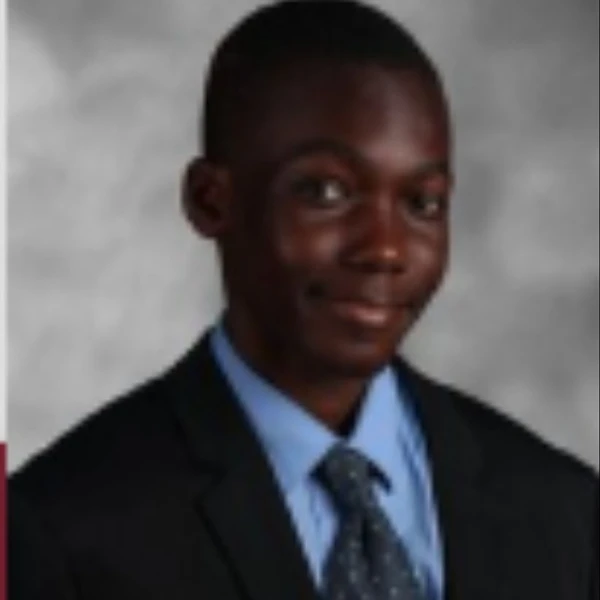
Hobbies and interests
Football
Tennis
Reading
Sports
Swimming
Exercise And Fitness
Exploring Nature And Being Outside
Wrestling
Reading
Suspense
Action
Adventure
Fantasy
Novels
Mystery
I read books multiple times per week
Ambrose Olaiya
5,635
Bold Points3x
Nominee1x
Finalist
Ambrose Olaiya
5,635
Bold Points3x
Nominee1x
FinalistBio
Hello! My name is Ambrose Olaiya, Thank you for visiting my profile! I am a 15-year-old and my goal in life is to be successful and have a great career. I am a hardworking student who is focused and highly driven in my school to achieve success.
Even though I am not the first generation to attend college in my family, I am still passionate about going to college and my family because they care about me so much and my education and making sure I will be successful. I am the oldest of 1 other sibling and I act as their motivation everyday to be great.
I am currently enrolled as a sophomore at Archbishop Curley High School. I take all Honor Classes because I enjoy challenging myself to go past even my own limit so that I can improve myself. I also participate in sports at my school all year round as a way to not just be active in the classroom but also participating in outside school activities.
My current goal after high school is to major in Cybersecurity or Psychology and I am grateful of Bold.org for providing scholarship opportunities that will help me achieve that goal. Community service and spending time with the marginalized are my two true passions in life, and I want to raise awareness of those who are unrecognized and struggling out there and I'm hoping that with the help of Bold.org, I will be able achieve my goal and get a good paying job that will allow me to help the community greatly.
Education
Archbishop Curley High School
High SchoolMiscellaneous
Desired degree level:
Master's degree program
Majors of interest:
- Computer/Information Technology Administration and Management
- Psychology, General
- Music
- Education, General
Career
Dream career field:
Information Technology and Services
Dream career goals:
To either go pro sports, or get a good paying cybersecurity job that allows me to take care of myself and family.
Helping pack lunches, helping out in the kitchen, or counting how many people came to eat.
The Franciscan Center2021 – Present5 years
Sports
Wrestling
Junior Varsity2024 – 20251 year
Football
Junior Varsity2023 – 20252 years
Tennis
Varsity2025 – 2025
Research
Bible/Biblical Studies
Archbishop Curley High School — Being a student.2024 – 2025
Arts
Archbishop Curley High School
Performance Art2024 – 2025
Public services
Volunteering
The Franciscan Center — Helping pack lunches, helping out in the kitchen, or counting how many people came to eat.2023 – Present
Future Interests
Volunteering
Philanthropy
Entrepreneurship
Shepherd E. Solomon Memorial Scholarship
Giving back to my community is something I consider both a responsibility and a privilege. I believe that each person has a role to play in making their environment better, no matter how big or small their contributions may be. I’ve found meaningful ways to contribute through volunteering at the Franciscan Center and helping with various school activities. These experiences have helped shape my understanding of service, compassion, and leadership.
At the food shelter, I assist with preparing and serving meals to individuals experiencing homelessness and food insecurity. This work is close to my heart because it reminds me how easily anyone can fall into difficult circumstances—and how even a simple, warm meal can offer a sense of hope and dignity. Through helping out, I’ve learned the value of consistency, respect, and kindness. Volunteering there is more than just handing out food but rather it’s about creating a welcoming environment, listening to people’s stories when they want to share, and showing them that they matter.
In addition to my work at the food shelter, I actively participate in school activities, whether it’s setting up for events, after school sports, or helping teachers and students during school functions. These responsibilities might seem small on the surface, but they build a sense of unity within the school community. They’ve also taught me valuable skills like communication, teamwork, and time management. Most importantly, they’ve shown me how small efforts add up to create something meaningful for the larger group.
Giving back is important to me because it creates connections and builds a stronger, more compassionate community. I’ve realized that the time and effort I give are investments in the well-being of others—and in myself. I feel a deeper sense of purpose when I’m helping someone else, and it reminds me to stay grounded and grateful. Service challenges me to be more aware of others’ needs and to think about how I can use my time, talents, and energy to support them.
Volunteering has also helped me grow personally. It has taught me patience, empathy, and leadership. I’ve learned to look beyond myself and understand the value of service not as charity, but as solidarity. I don’t help because I expect something in return—I do it because it’s the right thing to do, and because we all benefit when we support one another.
Giving back has helped me see that community isn’t just something we’re part of; it’s something we actively create. Whether I’m serving meals or helping run a school event, I’m reminded that positive change often starts with small actions done with great care. And for me, there’s no better reward than knowing I’ve made even a small difference in someone’s day.